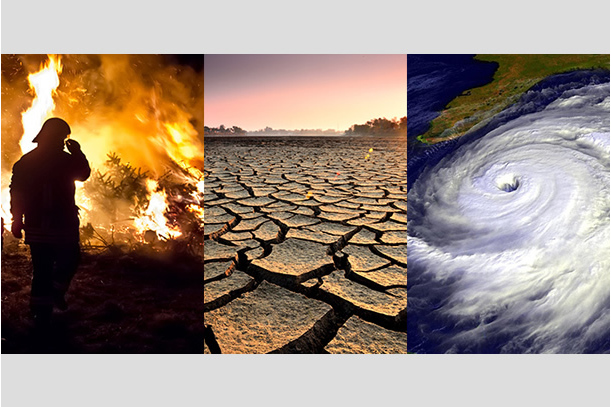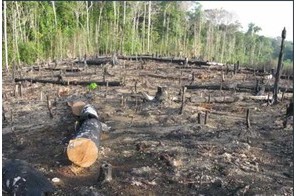Nigeria needs a bold response to climate change

Summary
Current and projected average temperatures in Africa are higher than the global average.
Many experts are raising the alarm that time may be running out to reverse global warming. The warnings are coming because there is not enough climate action to stem the extreme weather events that have become more frequent and more severe. The United Nations says the world needs to achieve net-zero greenhouse gas (GHG) emissions by 2050 to limit the devastating effects of global warming.
But to get to climate neutrality by mid-century, a report by the UN Intergovernmental Panel on Climate Change (IPCC) says slashing carbon pollution by 45 per cent by 2030 is crucial. Responding to the climate challenge, China announced last December it would cut GHG emissions by over 65 per cent by 2030. In nine years’ time, the European Union plans to cut emissions by 55 per cent and achieve net-zero emissions by 2050. After rejoining the Paris Agreement last month, the United States is expected to set a 2030 emissions target, setting the pace for President Joe Biden's campaign pledge of reaching carbon neutrality by 2050.
The two major areas of climate change response are mitigation and adaptation. The former entails actions to reduce emissions and limit warming; the latter involves efforts to adjust to both current and future climate change and its impacts. While it is commendable that some of the world’s biggest carbon emitters are taking bold actions to fight climate change, there is no assurance of meeting their emission targets. Besides, all countries must join the climate response to avoid reaching the tipping point that climate scientists and campaigners are warning about.
According to the UN, all countries need credible mid-term goals and plans that are aligned with the mid-century carbon neutrality objective. But African countries have been largely tepid in their response to climate change even though the continent is the most vulnerable to global warming and faces significant climate risks.
A report by the non-profit, Greenpeace, says extreme weather events like heatwaves, floods and intense rain are increasing in frequency, duration and severity across many parts of Africa. Current and projected average temperatures in Africa are higher than the global average, according to the report, which puts average temperature on the continent at 1.5 degree Celsius (℃), with mean annual temperature increase by the end of this century expected to fall within the range of 3-6℃. This is more than earth’s average temperature increase of slightly above 1℃ (2 degrees Fahrenheit), based on NASA's research. This far exceeds the goal set in the Paris Agreement for earth's average temperature rise.
Effects of a warmer planet such as droughts, desertification, flood, sea level rise, wind and rainstorms have displaced people in Africa from their homes, destroyed their crops, and torn families apart. Evidence of this abounds in Nigeria. Apart from Lake Chad that is drying up, a number of other lakes in the country are also shrinking.
The Nigerian Meteorological Agency’s 2021 Seasonal Climate Prediction (SCP) indicates that the length of the growing season in the country this year, based on the amount of rainfall and other factors, is expected to span between 110 days in the extreme north and over 300 days in the south. Climate variability in the north is a major culprit for the clashes between farmers and nomadic cattle rearers who are moving from the north to the south for greener pasture.
Granted that the sensitivity of the Nigerian agriculture sector to climate change and variability poses a critical threat to the country's food security, there are climate risks in other important economic sectors as well. Global warming affects all species and ecosystems, which play a role in socioeconomic development.
Despite the current and future climate threats, not much policy attention has been given to implementation of mitigation and adaption measures in Nigeria. Through oil production and unsustainable agricultural practices, the country is a major carbon emitter. Yet, it has no ambitious plan or bold vision to fight climate change.
The government demonstrated lack of ambition for climate action by proposing to cut emissions by just 20 per cent by 2030. The emissions reduction target is just an attempt at doing the bare minimum. Worse still, no serious commitment is in play to meet the target even as the country faces serious climate risks today.
The warnings by climate experts should spur policymakers to action. The Nigerian media needs to do a better job at informing the people. The economic benefits of climate action should be another pull factor to join the race for a better future for the planet. Bold climate action could deliver at least $26 trillion in economic benefits globally between now and 2030, according to the New Climate Economy.
Martins Hileis Executive Editor, Financial Nigeria magazine
Related
-
Brazil receives $96 million climate fund for reducing deforestation
Brazil reduced over six billion tonnes of tCO2e of emissions from cutting deforestation between 2006 and 2015.
-
Uganda launches NDC 3.0 development process
Quality NDCs will foster credibility and transparency in raising ambition on climate finance and other means of ...
-
UAE's global sustainability award opens for submission of entries
Winners in each category will receive $600,000 in prize funds to develop and enhance their existing sustainability ...







